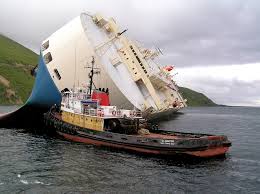salvage
英 [ˈsæl.vɪdʒ]
美 [ˈsæl.vɪdʒ]
- n. 打捞;海上救助;抢救财货;救难的奖金
- vt. 抢救;海上救助
- n. (Salvage)人名;(法)萨尔瓦热
使用频率:

记忆方法
1. salv- + -age.
中文词源
salvage 打捞,营救,抢救
来自拉丁语 salvare,挽救,抢救,来自 PIE*sol,完整的,词源同 solid,salvation,save.-age,名词 后缀。引申诸相关词义。
英语词源
- salvage
-
salvage: [17] The salvage of a ship is etymologically simply a payment made for ‘saving’ it. The word comes via Old French salvage from medieval Latin salvāgium, a derivative of late Latin salvāre ‘save’ (source of English save). The use of English salvage as a verb is a comparatively recent development, dating from the 1880s.
=> save - salvage (n.)
- 1640s, "payment for saving a ship from wreck or capture," from French salvage (15c.), from Old French salver "to save" (see save (v.)). The general sense of "the saving of property from danger" is attested from 1878. Meaning "recycling of waste material" is from 1918, from the British effort in World War I.
- salvage (v.)
- 1889, from salvage (n.). Related: Salvaged; salvaging.
权威例句
- 1. We definitely wanted to salvage some pride for British tennis.
- 我们当然想为英国网球挽回一些尊严。
- 2. Chantal was lucky to be able to salvage her career.
- 尚塔尔能保住她的事业算是走了运。
- 3. Once the fire has died out, the salvage team will move in.
- 一旦大火熄灭,救援小组就会马上进入。
- 4. Salvage operations have been greatly assisted by the good weather conditions.
- 天公作美,这大大促进了救援行动的顺利进行。
- 5. Diplomats are still hoping to salvage something from the meeting.
- 外交官们仍然希望能通过这次会晤挽回点什么。
